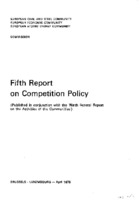| dc.description.abstract | In times of economic difficulty competition policy must continue to make its influencefelt alongside all the other Community policies. Its function is to preserve a situationin which the structural changes that are needed can take place. Although competitionpolicy can make only an indirect contribution to solving the economic difficulties nowbesetting the Community-and then only if it achieves its objectives-there can beno solution without it. The Commission has tried to ensure that competition policysatisfies the demands made of it-in the measures it has taken as regards both Stateaids and the business conduct of firms.The Commission considers that the proliferation of State aids as a means of mitigatingeconomic difficulties and their social consequences carries with it the risk of preservingindustrial structures that have failed to adapt to circumstances. Restrictive agreementsoffer no real solution to the crisis either. The Commission is paying particular atten-tio to the increasing popularity of joint ventures: they may in certain circumstanceshelp industrial rationalization, but they can be a mere fagade for anticompetitiveagreements too. It is also clear that a more systematic control of large-scale mergersis essential if harmful developments in the structure of industry are to be prevented.The Commission has, in addition, set itself the task of following closely the effect ofthe growing tendency of Member States to intervene in their economies through theagency of public enterprises.In the matter of State aids in 1975, as expected, the Commission had to deal withsignificantly more cases of assistance granted by Member States to offset the industrialand social effects of the serious economic crisis which the Community is experiencing.It has kept a close watch on the situation to ensure that the effect of the assistancewas not simply to transfer from one Member State to another the difficulties it wasintended to resolve or alleviate, and that it actively helped to solve structural problemsrather than merely masking them.Two factors have had to be borne in mind. First, a return to protectionist policies,however indirect, on the part of Member States cannot provide an effective solutionto the crisis. Second, a return to normal necessarily involves a structural adaptationof the machinery of production in the Community to major changes in internaldemand and in the international division of labour. |

